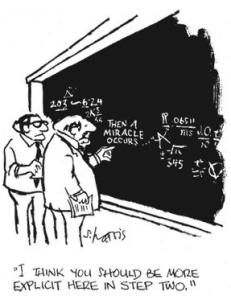Jan
30
2016
The Northeast Conference on Science and Skepticism (NECSS) will hold its 8th conference this year in New York from May 12-15. While we are expecting a great conference this year, the opening of registration has been marked by a bit of controversy. Last week we announced that Richard Dawkins would be a featured speaker at the conference. However on Wednesday we withdrew our invitation to Professor Dawkins.
This was a difficult and complex decision that requires further explanation, in the name of transparency and open discussion. I don’t expect to resolve any controversies here, just to explain our thought process and answer some of the questions and speculations that have been circulating.
NECSS is run by the New York City Skeptics and the New England Skeptical Society, both non-profit organizations. NECSS has its own executive committee, consisting of members of both organizations. (Added clarification: those members are Michael Feldman, Steven Novella, Jamy Ian Swiss, Benny Pollak, and Jay Novella.) There has been much speculation about who is making the decisions for NECSS – it is this committee. I will just say that there were a range of opinions on this matter within the committee, and we came to the best decisions we could, given that range of opinions. When I refer to “we” in this article, I am not speaking for every individual on the committee, just the majority result.
Continue Reading »
Jan
28
2016
A recent paper in PLOS One explores the mathematical probability of a grand conspiracy being revealed from within. The paper, of course, does not disprove any particular conspiracy theory, but it does make a compelling argument by putting into rigorous form a frequent argument against grand conspiracies, that they are too big not to fail.
As an aside, I love reading dry technical papers that are well-written. There is a certain efficiency and clarifying poetry to a precise technical discussion. It feels like it must be true because it sounds so objective and factual. A well crafted technical paper can slice through confusion and ambiguity like a scalpel.
For example, the author of this paper, David Robert Grimes, writes about conspiracies.
Conspiratorial ideation is the tendency of individuals to believe that events and power relations are secretly manipulated by certain clandestine groups and organisations. Many of these ostensibly explanatory conjectures are non-falsifiable, lacking in evidence or demonstrably false, yet public acceptance remains high. Efforts to convince the general public of the validity of medical and scientific findings can be hampered by such narratives, which can create the impression of doubt or disagreement in areas where the science is well established.
Continue Reading »
Jan
26
2016
 The World Health Organization (WHO) and Center for Disease Control (CDC) are warning about yet another virus epidemic, the Zika virus. It may seem like such warnings are overblown, but they do need to be taken seriously.
The World Health Organization (WHO) and Center for Disease Control (CDC) are warning about yet another virus epidemic, the Zika virus. It may seem like such warnings are overblown, but they do need to be taken seriously.
Zika Virus
The Zika virus (Flaviviridae, an arbovirus) is spread through Aedes mosquito bites, the same mosquitoes that also spread Dengue fever. The infections themselves are usually mild, causing fever, rash, joint pain, and conjunctivitis. Many of those infected may even have a subclinical infection, meaning they do not notice any symptoms.
However, the infection can have complications. There is one case report of Guillain-Barre Syndrome (GBS) following a Zika infection. GBS causes inflammation of the lining of nerves resulting primarily in weakness with variable recovery. This does not appear to be a huge risk, but something to monitor.
Continue Reading »
Jan
25
2016
Brian Resnick has written an interesting article on Vox in which he relates 11 common journalistic errors in reporting social science news, according to 20 social scientists that he spoke to. The points are good ones, and most of them apply to communicating all science, not just the social sciences.
The core of the issue is the essential tension between science and journalism. Science proceeds slowly and cautiously, is very conservative in its claims, and is skeptical toward any new finding (or at least it should be).
Journalists, however, want an exciting new and simple story. In fact bad science journalism is much closer to self-help gurus than to actual science – “do X and you will be happy.” I know that journalists often do not write their own headlines, and that there is a circle in skeptical hell dedicated to headline writers where they are tormented by the twin demons, Hype and Sensationalism.
To be fair, I also understand that we live in the real world where ratings and clicks matter to the bottom line. This has been made very clear to me since I have been running my own science Facebook page (The Skeptics’ Guide page). This gave me the experience of posting 6-8 science and skeptical news items per day, adjusting variables, and seeing directly how much reach each post gets.
Continue Reading »
Jan
22
2016
 I hadn’t planned on writing about GMOs again today, but I received an e-mail from a listener of the SGU which nicely represents common misconceptions that many people have about genetically modified organisms and farming in general. These are common anti-GMO talking points, which is why they are so widespread.
I hadn’t planned on writing about GMOs again today, but I received an e-mail from a listener of the SGU which nicely represents common misconceptions that many people have about genetically modified organisms and farming in general. These are common anti-GMO talking points, which is why they are so widespread.
That even thoughtful skeptics have these concerns is testimony to the successful misinformation campaign waged by the anti-GMO movement, which is largely the organic lobby and some in the environmental movement, such as Greenpeace.
The strategy here is also clear – whenever you deal with one misconception about GMOs, opponents just slide over to another point which becomes the “real” reason they are against GMOs. The experience is identical to arguing with those who reject the claims of anthropogenic global warming, when forced to give ground on one factual claim (OK, maybe the Earth is warming), they just retreat to another (but do we know that this is bad?).
Continue Reading »
Jan
21
2016
Words are important. They definitely shape how we think about things, and are critical for affecting public opinion. I feel that as scientists and skeptics we are often on the losing side of the branding wars, probably because of our pesky attachment to technical accuracy, transparency, and honesty. Or maybe we just stink at marketing.
There is one turn of phrase, however, that I think perfectly captures a situation and is useful for communicating the skeptical position – “grief vampires.”
Grief vampires are self-proclaimed psychics or mediums who prey upon the loved ones of those who have recently died. They exploit the grieving for their own monetary gain.
Continue Reading »
Jan
19
2016
 Charlie Sheen is HIV positive. As was revealed on the Dr. Oz show, when diagnosed his viral load was 4.4 million. After six months of the a standard anti-HIV cocktail his viral loads were undetectable.
Charlie Sheen is HIV positive. As was revealed on the Dr. Oz show, when diagnosed his viral load was 4.4 million. After six months of the a standard anti-HIV cocktail his viral loads were undetectable.
This does not mean he is HIV negative or free of this virus. As part of the viral life-cycle it goes into hiding inside of cells. It is undetectable while hiding, and also cannot be eradicated by medications. This is a major challenge to curing HIV, or even pushing the efficacy of our current treatments further. Researchers are looking into ways to force the virus out of hiding so that anti-retroviral medications can go to work.
With current anti-HIV treatment someone who is HIV positive can expect to live an almost normal life expectancy free of any major complications of the disease and will not go on to develop AIDS from the virus. The big challenge now is to get this modern medicine to those who are HIV positive in the third world, or to those who cannot afford it.
Continue Reading »
Jan
15
2016
 The dating of phenomena in the past, such as the existence of a specific species of animal or the presence of humans, is always based upon the earliest and latest evidence discovered so far. When you think about it, it is obviously very unlikely that we will have discovered the absolute earliest or latest occurrence of anything in the past.
The dating of phenomena in the past, such as the existence of a specific species of animal or the presence of humans, is always based upon the earliest and latest evidence discovered so far. When you think about it, it is obviously very unlikely that we will have discovered the absolute earliest or latest occurrence of anything in the past.
It it therefore very common for new discoveries of fossils or archaeological evidence to increase the range of a phenomenon. Date ranges are always tentative and changing, although new discoveries still often lead to headlines emphasizing how surprised scientists were at the find.
For example, when did humans first live in the Arctic circle? There are essentially three types of evidence for a human presence. The first is direct evidence – human fossils found in the location and dated to a specific time. The second is human artifacts, stone tools being the most common because they preserve well and are unambiguous human artifacts. The third is human activity, such as fire pits or butchered animals.
Continue Reading »
Jan
14
2016
 Continued from Part I
Continued from Part I
5) How to Analyze a Scientific Study
I don’t expect a non-scientist, or even a scientist far outside their area of expertise, to be able to do a detailed analysis of the strengths and weaknesses of a study. That is what peer-review is for. However, there are some basic rules of thumb that could give even a lay person a rough idea how seriously they should take a study. Always ask at least the following questions:
Is the study controlled in some way? Was the treatment group compared to a control group, or was the alleged effect compared to some baseline?
Is the study blinded? Were the primary measurements or assessments performed by someone who was blinded to whether or not the alleged effect is supposed to be present?
Are the outcomes being measured subjective or objective? How are they being measured? What do they really mean?
How large is the study? Studies with small numbers of subjects or measurements (less than 50 per group is a good rule of thumb) are considered small and unreliable.
Is the study an observation or an experiment? Are they just looking for some correlation (in which it is difficult to make statements about cause and effect), or are they controlling for variables and isolating the one factor of interest?
What is the reaction of the scientific community to the study? Are experts generally critical or excited about the results? Continue Reading »
Jan
12
2016
 What does it mean to be scientifically literate? There is no completely objective answer to this question, it can be defined in multiple ways and the bar can be set anywhere along a spectrum.
What does it mean to be scientifically literate? There is no completely objective answer to this question, it can be defined in multiple ways and the bar can be set anywhere along a spectrum.
Many tests of scientific literacy essentially ask a series of scientific facts – they are tests of factual knowledge, but not scientific thinking. This glaring deficit has been pointed out many times before, and was so again in a recent editorial by Danielle Teller. She writes:
There are a number of problems with teaching science as a collection of facts. First, facts change. Before oxygen was discovered, the theoretical existence of phlogiston made sense. For a brief, heady moment in 1989, it looked like cold fusion (paywall) was going to change the world.
I agree. A true measure of scientific literacy should be a combination of facts, concepts, and process. Facts are still important. Concepts without facts are hollow, and facts without concepts are meaningless. Both need to be understood in the context of the process that led us to our current conclusions.
Continue Reading »

 The World Health Organization (WHO) and Center for Disease Control (CDC) are warning about yet another virus epidemic, the Zika virus. It may seem like such warnings are overblown, but they do need to be taken seriously.
The World Health Organization (WHO) and Center for Disease Control (CDC) are warning about yet another virus epidemic, the Zika virus. It may seem like such warnings are overblown, but they do need to be taken seriously. I hadn’t planned on writing about GMOs again today, but I received an e-mail from a listener of the SGU which nicely represents common misconceptions that many people have about genetically modified organisms and farming in general. These are common anti-GMO talking points, which is why they are so widespread.
I hadn’t planned on writing about GMOs again today, but I received an e-mail from a listener of the SGU which nicely represents common misconceptions that many people have about genetically modified organisms and farming in general. These are common anti-GMO talking points, which is why they are so widespread. Charlie Sheen is HIV positive. As was revealed on the Dr. Oz show, when diagnosed his viral load was 4.4 million. After six months of the a standard anti-HIV cocktail his viral loads were undetectable.
Charlie Sheen is HIV positive. As was revealed on the Dr. Oz show, when diagnosed his viral load was 4.4 million. After six months of the a standard anti-HIV cocktail his viral loads were undetectable. The dating of phenomena in the past, such as the existence of a specific species of animal or the presence of humans, is always based upon the earliest and latest evidence discovered so far. When you think about it, it is obviously very unlikely that we will have discovered the absolute earliest or latest occurrence of anything in the past.
The dating of phenomena in the past, such as the existence of a specific species of animal or the presence of humans, is always based upon the earliest and latest evidence discovered so far. When you think about it, it is obviously very unlikely that we will have discovered the absolute earliest or latest occurrence of anything in the past. Continued from Part I
Continued from Part I What does it mean to be scientifically literate? There is no completely objective answer to this question, it can be defined in multiple ways and the bar can be set anywhere along a spectrum.
What does it mean to be scientifically literate? There is no completely objective answer to this question, it can be defined in multiple ways and the bar can be set anywhere along a spectrum.




